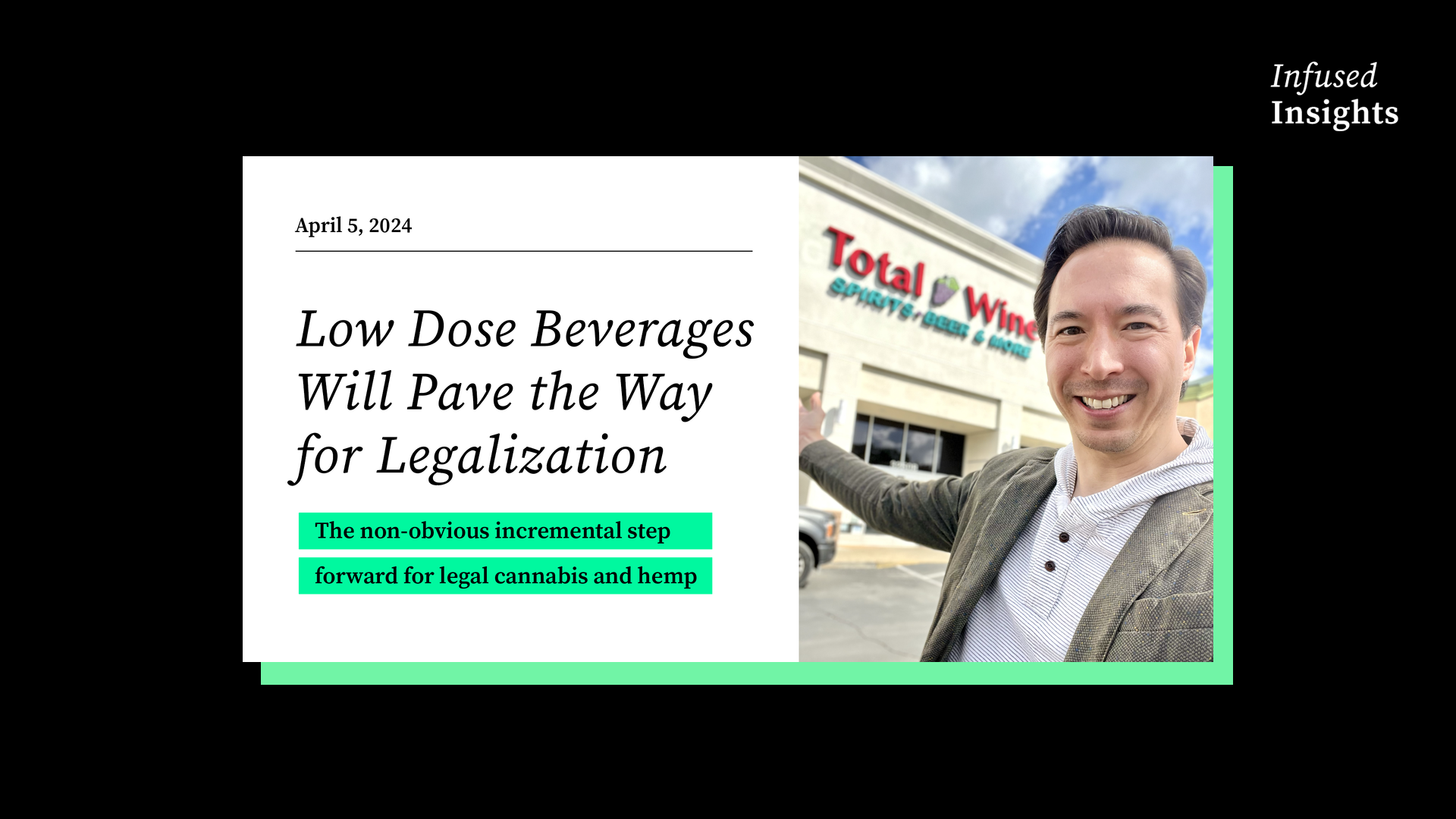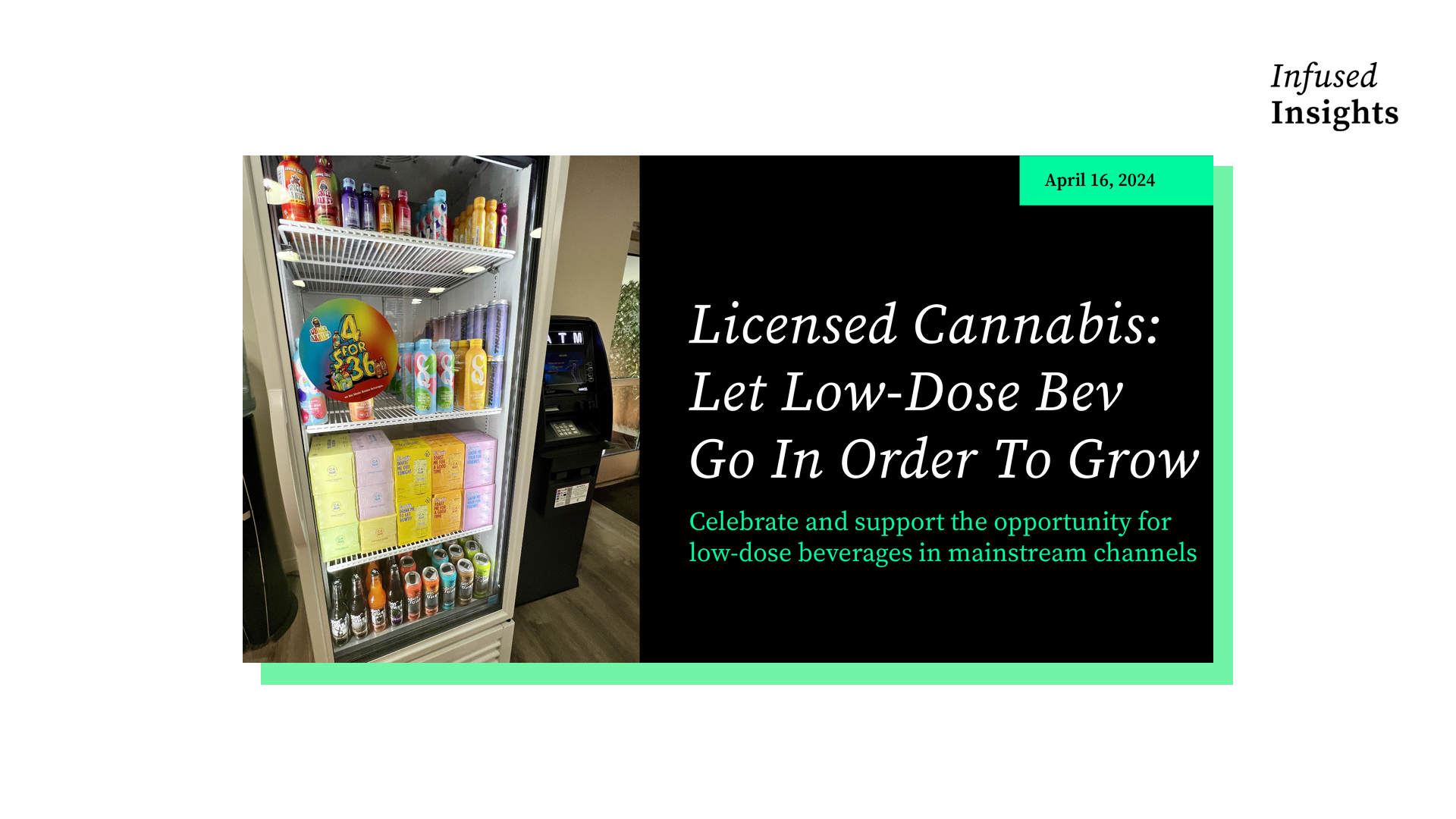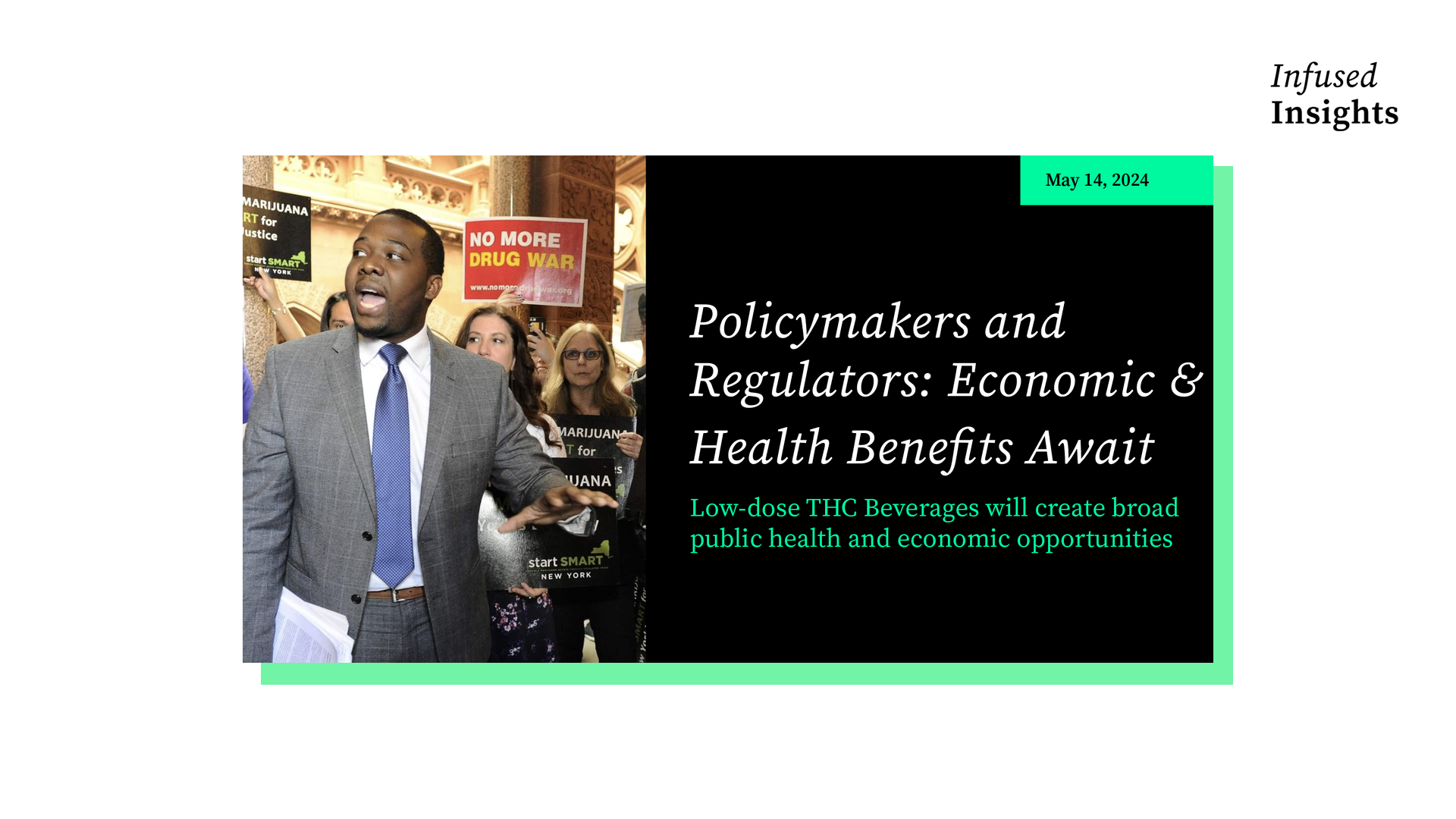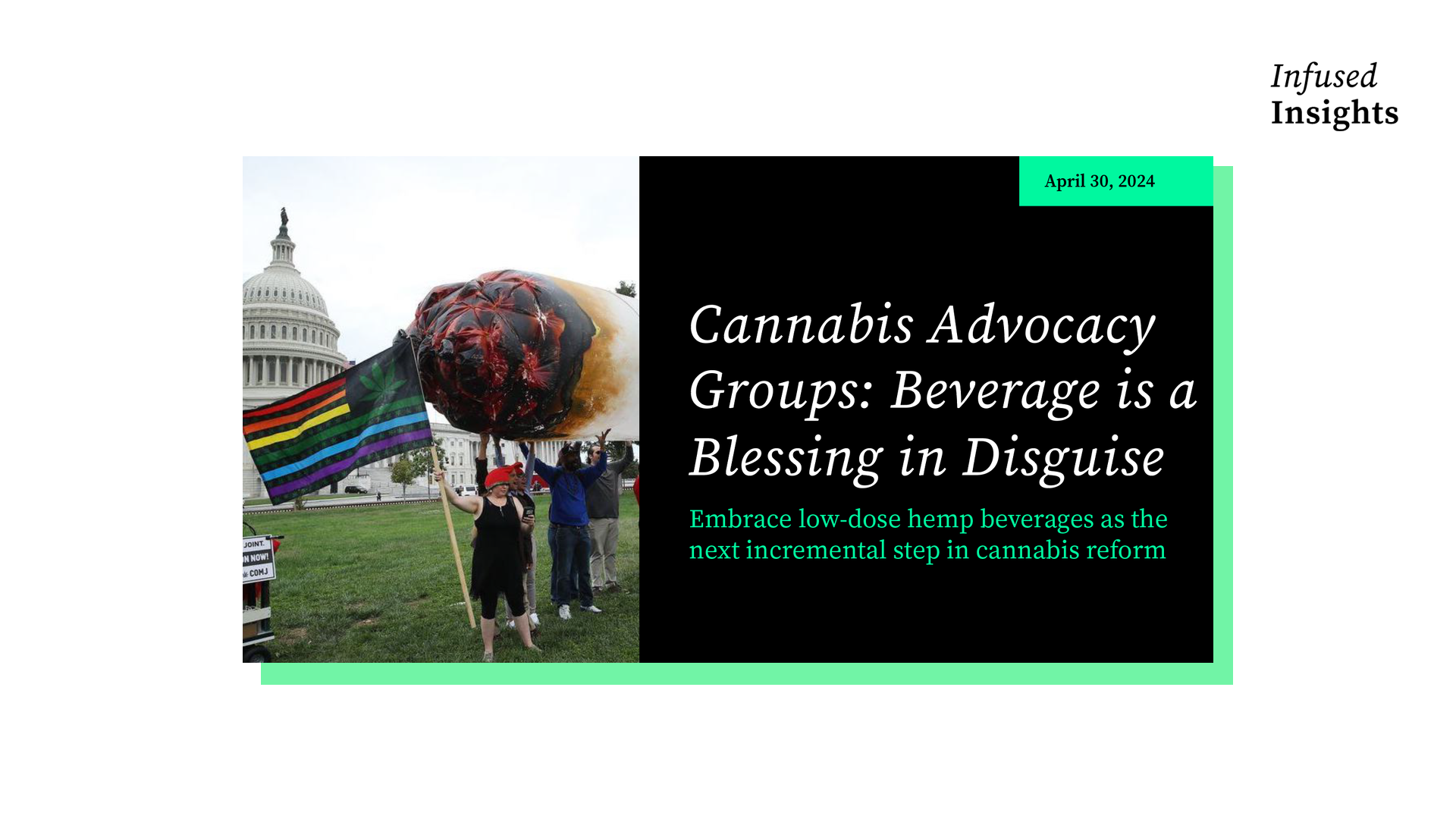Licensed Cannabis Operators: Let Low-Dose Beverages Go In Order to Grow
This post originally appeared on Ben's LinkedIn Newsletter, Infused Insights. You can read and leave comments here. {% video_player "embed_player"...

This post originally appeared on Ben's LinkedIn Newsletter, Infused Insights. You can read and leave comments here.
It's been some time now that I've been ruminating on how to deliver this article. With the alphabet soup of organizations for which I'm associated, it's important that I state these thoughts are my own and are not representative of any particular group, though I may wish them to be or some may already largely agree. Perhaps, by the time you're done reading, you'll agree as well. Let me know your thoughts. -B.
LinkedIn feeds have been awash with images of THC beverages making their grand entrance onto the shelves of Total Wine, among other retailers, and even gracing the menus of on-demand services like DoorDash. You might have even had the pleasure of seeing this firsthand. Yet, how one perceives this burgeoning trend can vary widely, from acceptance and enthusiasm to ambivalence, or even outright objection.
I'm here to argue that anyone who stands behind the push for cannabis legalization ought to not just welcome but actively champion and safeguard this emerging trend. Whether you're deeply entrenched in the cannabis industry as a licensed operator or on the opposite side of the fence as an online hemp merchant or brand, or perhaps outside the industry as a distributor of beers and spirits, a regulator, a politician, or simply someone who falls somewhere within that broad spectrum, the rise of low-dose THC beverages represents a significant, positive stride for the broader cannabis and hemp legalization movement. It's a pivotal moment that promises widespread benefits for the entire ecosystem.
The allure and safety of beverages as a form factor for consumption are unparalleled when it comes to the broader realm of consumer products. I've often referenced and drawn inspiration from one of my favorite books, A History of the World in Six Glasses, where it details how beverages have been a constant companion in the evolution of human society, marking significant cultural and historical milestones through beer, wine, spirits, coffee, tea, and cola. This historical perspective sheds light on why I've seen countless individuals gravitate towards cannabis for the first time when presented in a familiar and accessible beverage format.

Positioning THC-infused beverages as the gateway to cannabis accessibility offers a golden opportunity to dismantle the prevailing stigma surrounding THC. It paves the way for a broader societal acceptance, showcasing THC not as a substance to be feared but as a potential staple in one's wellness regimen, offering an alternative to substances with more harmful profiles, such as alcohol.
The critical role of low dose and stringent quality control cannot be overstated in this context. The inherent design of low-dose beverages naturally mitigates the risk of overconsumption or adverse reactions, providing a safer consumption experience. By gradually sipping and feeling the effects over time, consumers are afforded the luxury of fine-tuning their intake, a level of control seldom offered by other consumption methods or higher-dose options. As society becomes more familiar with these products, this introductory phase will serve as a vital learning curve in understanding and practicing proper dosing, setting the stage for a potential expansion in the future.
It's in recognizing the power of these small, yet radical, steps forward that we can truly appreciate the path toward broader acceptance and legalization.
Most people overestimate what they can achieve in a year and underestimate what they can achieve in ten years. - Bill Gates
Navigating the shifting landscape of cannabis and hemp legislation often feels like traversing an ever-changing labyrinth—tedious, perplexing, and frustratingly slow. For those deeply entrenched in the hemp or cannabis sectors—or perhaps straddling both—the battle for recognition and legal acceptance has been a grueling marathon, marked by intense efforts, enduring struggles, and the persistent anticipation of challenges ahead.
In our collective push towards legalization, there's an inherent desire within the cannabis and hemp community to make significant strides whenever the potential arises. However, it's precisely this ambition that can lead to immense division within our ranks. The quest for equality with established mainstream markets is unanimous; we all believe it to be long overdue. Yet, the strategies to achieve this goal are a source of intense debate, creating rifts and solidifying divisions. My aim isn't to overhaul anyone's mission or vision but to suggest a slight pivot—embracing low-dose THC beverages as a sensible, incremental step forward.
We must recognize the value of integrating low-dose THC beverages into mainstream channels without stifling the progress or capitalizing on it for short-term gains. The alcohol industry provides a blueprint with its existing, regulated infrastructure—comprising regulators, manufacturers, distributors, and retailers experienced in navigating a tightly regulated and age-restricted marketplace. This system is already well-equipped to handle beverages, making it an ideal model for introducing cannabis-infused beverages. This approach doesn't just open new doors; it leverages a tried-and-true pathway, setting the stage for broader acceptance and eventual legalization, one carefully measured step at a time that doesn't threaten the trust of the broader landscape.

A recent THC infused beverage installation at Total Wine in Southern California.
Next in the series: Licensed Cannabis Operators: Let Low Dose Beverages Go >

This post originally appeared on Ben's LinkedIn Newsletter, Infused Insights. You can read and leave comments here. {% video_player "embed_player"...

This post originally appeared on Ben's LinkedIn Newsletter, Infused Insights. You can read and leave comments here. {% video_player "embed_player"...

1 min read
This post originally appeared on Ben's LinkedIn Newsletter, Infused Insights. You can read and leave comments here. {% video_player "embed_player"...